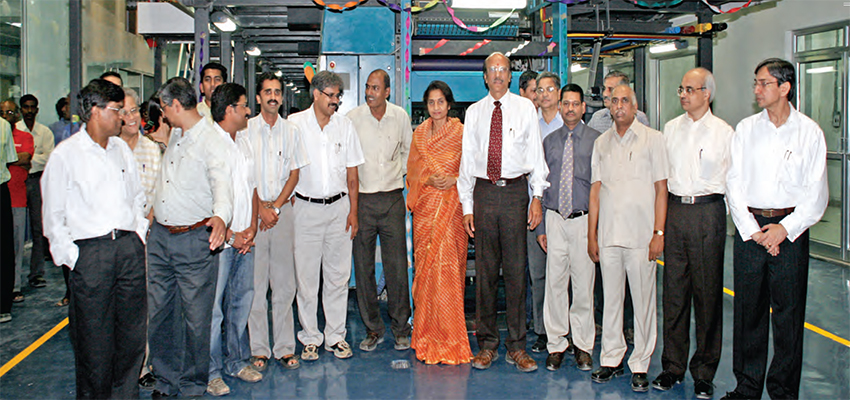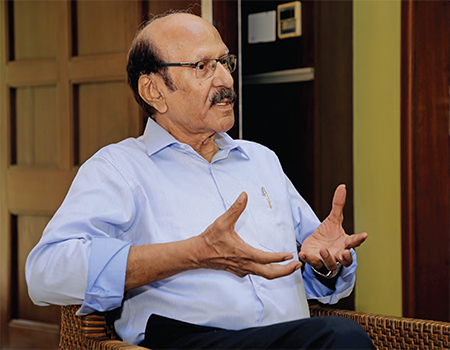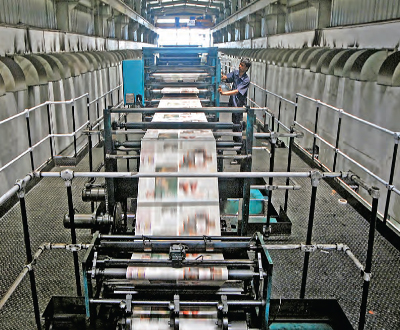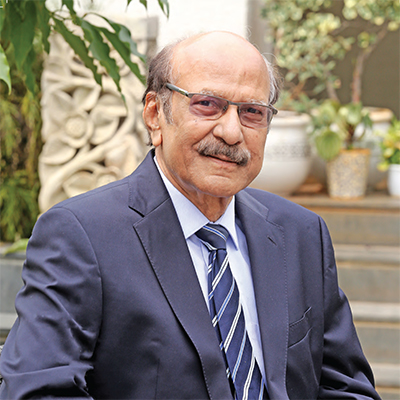Milestones in Media

"Like any organisation, journalism must also adapt and upgrade to keep up with changes in the industry. It is crucial that we upgrade ourselves in technology and understand its importance, utilities, and challenges to stay ahead in the industry"
-Prataprao Pawar
Prataprao Pawar, a Bachelor of Engineering from Birla Institute of Technology & Science (BITS), Pilani, is the Chairman, Sakal Media Group; Director, Bharat Forge Ltd, Pune, and Bharat Forge International Ltd., U.K. He was also the former Director of Force Motors Ltd., Kirloskar Oil Engines India Ltd., and Finolex Cables Ltd. Pune. A Former President of The Mahratta Chamber of Commerce, Industries & Agriculture, Pune, he is presently its President of the Council of Past Presidents. On the media front, he is also the Chairman of the Audit Bureau of Circulations, Mumbai, and was the President of The Indian Newspaper Society, New Delhi in 2001-2002. Presently, he is the Chairman of the Maharashtra Region of Advertising Committee. He was appointed to the World Association of Newspapers (WAN- IFRA, Paris) Board of Directors as the Indian Newspapers Society’s representative of India as Vice President in June 2007. He was also appointed on the Executive Committee of the WAN as a member on January 2006. Prataprao Pawar shares with Corporate Citizen his entrepreneurial journey as media magnate and the secret of his consistent success
Corporate Citizen: You are an alumnus of Birla Institute of Technology and Science (BITS) Pilani. What made you opt for Engineering?
Prataprao Pawar: When we were young, we possessed scant knowledge of any subject or profession. While I had an affinity for science, medical science did not appeal to me. Therefore, I opted for engineering among the other conventional choices of Arts, Science, and Commerce. Fortunately, I was accepted into BITS Pilani. Studying at Pilani provided me with an opportunity to learn alongside individuals from various Indian states, which broadened my perspective. My experience at BITS Pilani influenced how I perceive other cultures and communities as an Indian and allowed me to compare the advantages and drawbacks of my own state’s culture and affairs with those of other states in India.
CC: After your education at BITS Pilani, where did you start your career?
One of the great things about studying at Pilani was that each year of the four-and-a- half-year course required me to gain two and a half months of industrial work experience. Additionally, we had to prepare for an annual interview conducted by an industry expert. I was pleased to have achieved the highest marks in the interview, which boosted my self confidence in my abilities to administer in a business enterprise. Through this experience, I also discovered that while I am not particularly strong in academics, I have a talent for other business aspects of effective administration and management.

At the time, there was a lot of peer pressure to go to the United States of America (USA) for further studies, as the majority of students aspired to do so. However, the industry experience I gained in India as part of the curriculum helped me realise that USA was not the right fit for me. Through the industry exposure facilitated by BITS Pilani, I gained a deeper understanding of my strengths and abilities.
I had many Marwari friends who were well- versed in business, and my association with them influenced my decision to venture into the field. Fortunately, my brother also had some exposure to business, and we started our maiden company, Ajay Metachem, out of a garage. With our dedicated efforts, the business grew over time.
"Our approach is to modernise and prepare for future challenges without compromising our newspaper’s philosophy. We find it fulfilling to provide a print newspaper reading experience, which is different from consuming content on mobile devices"
CC: For how many years did you run the business and when did you shift to Sakal Newspaper.
A decade and a half later, in 1985, an opportunity arose for us to take over the iconic Marathi newspaper Sakal, which was previously owned by the stalwart editor, Nanasaheb Parulekar. He had pioneered public journalism and readers had developed a sense of belonging towards Sakal. Prior to his passing away in 1973, Mr. Parulekar had detailed in his will that his shares in Sakal were to be sold, rather than passed on to his family. He believed that selling the shares would ensure the survival of the company and had made separate arrangements to address the financial concerns of his family.
The trustees tasked with carrying out Mr. Parulekar’s Will, began their search for suitors to take over Sakal. This search included five groups, such as Pudhari and other organisations. Despite being one of the last suitors to make an offer, we ultimately offered the best price and accepted the terms and conditions of the takeover. Contrary to popular belief, we were approached by the trustees for the takeover, rather than the other way around.
In my mind, the offer to sell Sakal was a commodity that I had offered the best price for, and I had exercised my best judgement to do justice to the organisation. This decision was based on both moral and legal grounds.
CC: What was the nature of Journalism when you took over?
I strongly believed that I had the means to do good for the society by running a newspaper that could reach hundreds of thousands of people every day. This was an opportunity for me to make a difference, given that I was already involved in many social activities. I advised the editor about the newspaper’s policy and provided him guidelines to run it. I emphasised the importance of being unbiased, constructive, positive, and informative. I also advised him to conduct himself with the understanding that we were running the newspaper for the betterment of society. Once this was made clear, I never interfered with the various editors along Sakal’s journey.
 Sakal printing press at Diveghat, Pune
Sakal printing press at Diveghat, Pune
Having clarity of purpose in running the newspaper for the betterment of society brought accountability to us. Even today, I do not interfere in the editorial department in the evenings. I read Sakal in the morning, and it is the editor’s responsibility to exercise judgment in editing content. As long as the editors abides by the guidelines, they are free to exercise their editorial judgment. This approach made our people at Sakal fearless and rational. They may have made mistakes, but I always considered whether the mistake was intentional or unintentional. This approach helped us build a highly capable team at Sakal that contributed to the newspaper’s progress.
I do not view Sakal as just an ownership or proprietary organisation. Instead, I see it as a social and economic one. Running it required us to keep all these aspects in mind. We received a Gold Medal for Agrowon, our agricultural based newspaper, on this March 16th, not only because we provided information but also because we modernised the organisation and made the newspaper more accessible.
CC: Sakal had gone into English Mode wiith ‘Sakal Times’. Why did it close down?
Sakal Times was not able to keep up with the peer competition due to differences in economics, which led to its closure. As a result, we decided to concentrate our resources where we could excel. We added Agrowon to our portfolio and then acquired ‘Gomantak’ of Goa. With the addition of ‘Gomantak Times’ and ‘Gomantak,’ we became the leading newspaper in Goa. Instead of wasting our resources on Sakal Times which did not click for us, we focused on what we could do better. Today, we have Sakal, Agrowon, Gomantak, and Gomantak Times— all of which are performing very well.
"Despite the introduction of new forms of media, such as radio in 1935 and 24/7 news channels today, print media has not been eradicated. Print media has managed to survive and I believe it will continue to do so."
CC: What strategy did you adopt to keep your newspapers going without adversely affecting the readers in terms of price and so on?
I came to know of the Metro newspaper tabloid in the UK, which started in 1995, was being distributed for free and is presently printing over 6.5 crore copies per day. This inspired me to reject my editor’s proposal to increase the price of Sakal and instead reduce its price. Despite initial scepticism from my team, I believed that if we did not follow the same strategy as Metro, our newspaper may not survive. To ensure the financial sustainability of the newspaper, we explored alternative revenue streams and engaged in various activities to boost our economy. At the same time, we prepared ourselves by engaging with the world media and staying up-to-date with media developments. For instance, I have served on the board of World Association of Newspapers for the last 15 years, which has given me access to influential media figures. Our approach is to modernise and prepare for future challenges without compromising our newspaper’s philosophy. We find it fulfilling to provide a print newspaper reading experience, which is different from consuming content on mobile devices. Today, Sakal, Agrowon, Gomantak, and Gomantak Times are all thriving under our focused and resourceful approach.
CC: So now you have decades of observation and experience with media. What has changed? The journalist, the journalism, or is it the social environment that has changed journalism?
Like any organisation, journalism must also adapt and upgrade to keep up with changes in the industry. In the case of Agrowon, it is modern technology that has helped us become the number one newspaper. Adhiraj Chavan continues to be the editor, but we have updated our format and added various new features to our printing process. We are using all available formats to educate our readers, including the latest technologies. It is crucial that we upgrade ourselves in technology and understand its importance, utilities, and challenges to stay ahead in the industry.
CC: What is the future of not only Journalism but also Multimedia?
Despite the introduction of new forms of media, such as radio in 1935 and 24/7 news channels today, print media has not been eradicated. In fact, when radio was first introduced, the British government enacted a law to limit its use for news after 5pm in order to protect the readership of newspapers the following day. Despite the proliferation of new media channels, print media has managed to survive and I believe it will continue to do so.
CC: You are a stickler for time punctuality and fitness. Please tell us about it

When I first entered the metallurgy industry, I was quickly burdened with a plethora of social responsibilities, despite not having explicitly sought them out. These duties had strict time constraints, forcing me to carefully manage my schedule and avoid neglecting them due to lack of time. As a result, I made punctuality an integral part of my lifestyle and character. This trait has greatly influenced the functioning of my organisation, such as at Sakal, where events start promptly at the scheduled time, regardless of audience attendance. The attendees have come to appreciate the importance of discipline and respond accordingly by arriving on time. I view attendees as guests and strive to never keep them waiting, as this would be an offense to the principle of “Atithi Devo Bhava.” Even if a large number of people are attending an event, I value every single minute of their time and do my utmost to avoid wasting it. This same philosophy of valuing and not wasting time has become a defining characteristic of Sakal’s organisational culture.
As for fitness, in 1991, I came across the book called, "Reversing Heart Disease" by Dr Dean Ornish. One sentence in the book left a profound impact on me: “If you don’t have time to exercise, it means you don’t have priorities for your health.” This statement made me realise that prioritisation is the key. For example, if you have a flight to catch, you will make sure to pack your bags in advance, wake up early, and make it to the airport on time. The same applies to exercise and taking care of our health. We all have 24 hours in a day, and it’s up to us to prioritise how we use that time. Personally, I make it a priority to dedicate one hour of my day to Yoga and exercise, and I have successfully stuck to this routine 99% of the time.
CC: What is the philosophy of life that you live by?
Our parents instilled in us the value of not living a self-centred life and giving equal value for our social commitments to society, and reiterated that we should not lead a life of anonymity and futility. We followed this advice, and as a result, my family and I have received abundant support and opportunities. Despite this, I have never sought awards or honours, including the Padma Shree, as I believe that living a life of service to others is its own reward.
CC: NCP supremo Sharad Pawar is your brother. How do you look up to him? Or how do you regard him as a politician and what do you admire about him?
Politics has not been an area of interest for me thus far. However, I hold Mr. Sharad Pawar in high esteem as he is 90% a constructive person and only 10% a politician. He possesses a sharp intellect and shrewdness, but always has a heart for improvement. He has the unique ability to connect with both the smallest farmer as well as members of any highest international forum. I greatly respect him for his selflessness, dedication, vision, and achievements.
In Baramati, there are two trusts dedicated to education and agricultural development, respectively. These trusts have garnered recognition from some of the world’s leading organisations, including Microsoft and Oxford University, which are working in collaboration. Such recognition from esteemed organisations is a testament to the high merit of these trusts.
As Mr. Sharad Pawar’s brother, I maintain a close and loving relationship with him, despite our different career paths. He has never questioned me about why a particular article was not published in the last 30 or 40 years. While I stay away from politics of any party as it is not my cup of tea, I have great respect for the clear isolation and demarcation that exists between our fields of work.